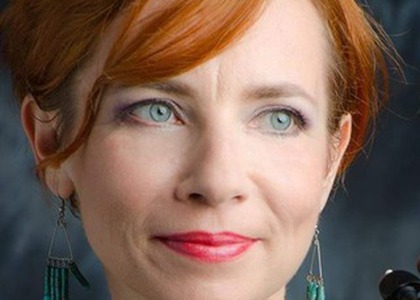> [Archived] Interviews

Interview with Emőke Kovács, manager of the "Dinu Lipatti" Philharmonic Orchestra
Musical institutions across the country are in full swing in mid-March - a good opportunity to find out some details about the current season. About the concerts that will take place at the "Dinu Lipatti" Philharmonic in Satu Mare, but also about those that have already taken place, we find out more from Emőke Kovács, the manager of the Satu Mare institution.
Talking about the current season, I think we should start with the events that have already happened. How would you describe the reactions you have received from the audience so far?
In recent years, we've strived to diversify our repertoire. We have also managed to bring a different kind of audience to our concert hall with a lot of interest. I can also boast that we are already starting to succeed in making sold-out projects.
What does this different audience mean?
An audience not yet used to classical music. And we try to attract them with film music, symphonic tango and the compositions of Astor Piazzolla. Here I would mention Analia Selis and Mariano Castro. But we also had guests, for example, Andrei Tudor and Irina Baianț in a concert dedicated to love, where the emotion brought by the full hall of the philharmonic fully contributed to the success of the musical event. I would also like to remind you that our musicians are continuing a series of educational concerts for young people, a different kind of audience, concerts that seem to be a recipe for success for our young audiences, who are coming in ever-increasing numbers to the Philharmonic Hall.
Although the temptation is great for concerts of crossover classical music and pop-opera, concerts that invariably sell out, our institution still follows its mission to keep classical music performance high on the agenda. In fact, the purchase of a Steinway concert piano is part of this effort to bring renowned soloists to our stage.
As a proof of this, there is the presence on our stage of Horia Mihail, Eva Garet, Csiki Boldizsar or Aurelia Vișovan, several pianists, but also the concerts in which established musicians such as Alexandru Tomescu, Răzvan Suma, Răzvan Stoica were invited. And among the exceptional conductors, I would like to mention Azis Sadikovic, with whom I was also at the Enescu Festival, Serghei Simakov, Paul Mann.
I note in the programme of concerts already announced various works and renowned artists. How did you come up with such an attractive list of events?
We are always close to our audience and very attentive to their wishes. At the same time, we also keep in touch with them, we play games in which they can show off what they like, what they liked in the programmes they played, what they are waiting for... We put a lot of emphasis and we are trying to diversify the repertoire. And, as I mentioned before, to be able to bring in a different kind of audience, so that everyone in Satu Mare can have a variety of concerts in the philharmonic.
By the end of this season we will also have, as a new event, "Don Pasquale" in concert opera form, conducted by Mihnea Ignat. And among the important names to participate in the upcoming concerts of this season I can list Cristian Mandeal, Junping Qian, Theo Wolters, but also violinist Remus Azoiței and Lakatos Robert. Everything beautiful we try to bring to Satu Mare!
How exactly do you find out audience preferences?
We even talk to them, but we also have a group of subscribers where they can share their opinions about the concerts, we also have a Facebook page of the philharmonic, where we accept and even respond to all requests from the public and observers. It's very simple. But, in conclusion, I don't know if it is due to this, I can say that this year the audience has returned to the concert hall. Both subscriptions and ticket sales are increasing all the time, which proves that the thrill of live music can't be compared to anything else.
Translated by Bianca Penaru,
University of Bucharest, Faculty of Foreign Languages and Literatures, MTTLC, year I
Corrected by Silvia Petrescu














